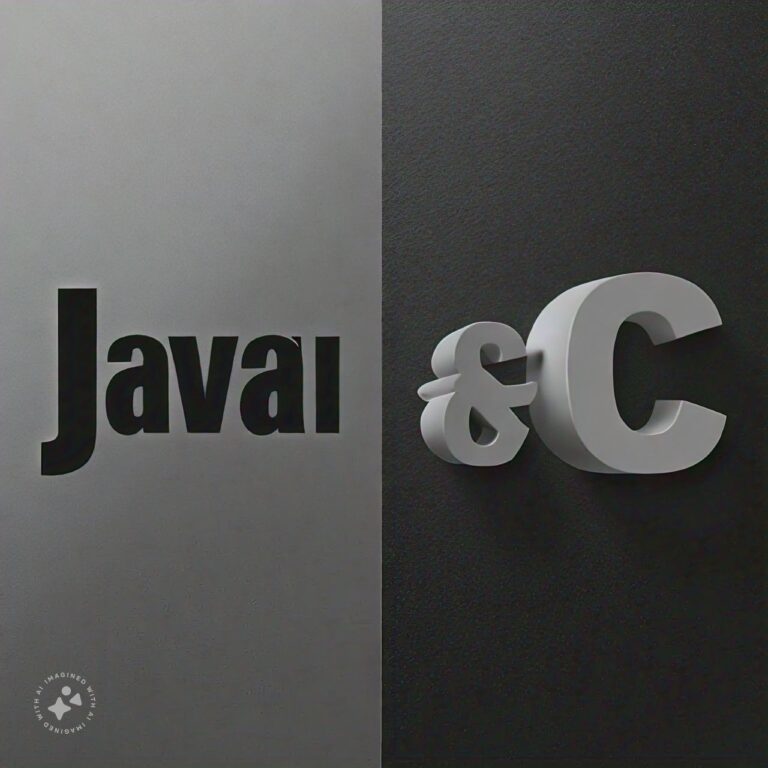
Differences Between Java and C
Understanding Two Foundational Programming Languages
When it comes to programming languages, Java and C are two of the most influential and widely used languages in the world of software development. Both languages have played a critical role in shaping modern computing, but they differ significantly in their design, functionality, and application areas. C, developed in the early 1970s, is a procedural language that has had a profound impact on subsequent programming languages due to its simplicity and close-to-hardware capabilities. It is often used for system programming, embedded systems, and applications that require low-level memory manipulation. On the other hand, Java, introduced in 1995 by Sun Microsystems, is an object-oriented, high-level language designed for portability, security, and ease of use in large-scale enterprise applications.
While C is known for its speed and efficiency, especially in resource-constrained environments, Java excels in cross-platform compatibility and its ability to run on any system with a Java Virtual Machine (JVM). These languages serve different purposes, with C being preferred for system-level programming and Java being ideal for web and enterprise applications. Understanding the key differences between Java and C is crucial for developers as they choose the right tool for specific tasks and projects.
Java Overview
What is Java?
Java is a high-level, object-oriented programming language that was designed to be platform-independent, meaning that code written in Java can run on any machine with a Java Virtual Machine (JVM). This makes Java highly portable, a key feature that sets it apart from many other languages. Java was developed by James Gosling at Sun Microsystems (later acquired by Oracle) and was first released in 1995. It quickly gained popularity for its simplicity, versatility, and powerful features.
Key Features of Java
- Object-Oriented:
Java is a fully object-oriented programming language, meaning that everything in Java is treated as an object. This allows developers to create modular programs and reusable code. Key concepts of object-oriented programming, such as inheritance, encapsulation, polymorphism, and abstraction, are central to Java’s design. - Platform Independence:
One of Java’s most significant advantages is its “write once, run anywhere” capability. Java programs are compiled into bytecode, which can be executed on any platform with a JVM. This eliminates the need for recompiling code for different systems, making Java highly portable and popular for web and enterprise applications. - Memory Management:
Java handles memory management automatically with its garbage collection feature, which reclaims memory from objects that are no longer in use. This simplifies the programmer's job by reducing the risk of memory leaks and manual memory management errors. - Security:
Java provides built-in security features that make it a robust language for building secure applications, particularly in distributed systems and web-based applications. The Java security model includes features like access control, cryptography, and secure communication protocols. - Multithreading:
Java supports multithreading, allowing developers to write programs that can perform multiple tasks simultaneously. This is particularly useful in applications that require efficient resource use and responsiveness, such as server-side applications.
Common Applications of Java
Java is widely used across various industries and sectors due to its versatility and robust features. Some of the most common applications of Java include:
- Enterprise Applications: Java is a favorite for building large-scale enterprise applications due to its scalability, security, and platform independence.
- Mobile Applications: Java is the primary language used for developing Android applications, which are used on millions of devices worldwide.
- Web Applications: Java-based frameworks such as Spring and JavaServer Pages (JSP) are commonly used to develop dynamic web applications.
- Game Development: While not as common as C++ or Python for game development, Java is used in some game engines and for developing Android games.
Java’s design, with its object-oriented structure and cross-platform capabilities, makes it ideal for a wide range of programming tasks, from simple applications to complex, distributed systems.
C Overview
What is C?
C is a general-purpose, procedural programming language that was developed in the early 1970s by Dennis Ritchie at Bell Labs. C has had a profound influence on many later programming languages, including C++, Java, C#, and Objective-C. C is known for its efficiency and ability to work closely with hardware, making it an excellent choice for systems programming, embedded systems, and applications where performance is critical.
Key Features of C
- Procedural Programming:
C is a procedural language, meaning that it follows a sequence of commands or instructions to execute tasks. Unlike object-oriented languages like Java, C focuses on functions and procedures rather than objects and classes. This makes it straightforward but requires more attention to details like memory management. - Low-Level Access:
C provides low-level access to memory, allowing programmers to manipulate memory addresses directly using pointers. This gives C programs the ability to interact with hardware more efficiently, making it ideal for system-level programming such as operating systems and device drivers. - Efficient Performance:
One of the main reasons C is still widely used is its efficiency. Because C is compiled directly into machine code, it executes faster than interpreted languages like Java, making it an excellent choice for performance-critical applications. - Memory Management:
Unlike Java, C does not have automatic garbage collection. Memory management in C is done manually, requiring the programmer to allocate and deallocate memory using functions likemalloc()andfree(). While this provides more control, it also introduces the potential for memory leaks and errors if not managed carefully. - Portability:
C is portable in the sense that C programs can be compiled on different platforms with minimal changes, although it lacks the platform independence of Java’s JVM. Despite this, C code can run on nearly any machine with a compatible C compiler, which has contributed to its popularity across various industries.
Common Applications of C
C is highly versatile and can be found in a wide range of applications, particularly in areas that require close interaction with hardware. Common uses of C include:
- Operating Systems: Many of the world’s most widely used operating systems, including Unix, Linux, and early versions of Windows, were written in C.
- Embedded Systems: C is the language of choice for embedded systems programming due to its low-level memory access and efficiency. Microcontrollers and hardware devices often run C code.
- System Software: Compilers, assemblers, and other system software are often written in C because of its ability to efficiently handle hardware-level tasks.
- Game Development: C has been used in game development, particularly for games that require high-performance rendering and low-level resource management.
C remains one of the most widely used languages in the world, especially in applications that require maximum control over system resources and performance.
Differences Between Java and C
- Programming Paradigm:
- Java: Object-oriented programming language.
- C: Procedural programming language.
- Memory Management:
- Java: Automatic garbage collection.
- C: Manual memory management using
malloc()andfree().
- Platform Independence:
- Java: Platform-independent; runs on any machine with a JVM.
- C: Platform-dependent; requires recompilation for different platforms.
- Compilation:
- Java: Compiled to bytecode, which is interpreted by the JVM.
- C: Compiled directly into machine code, executed by the hardware.
- Speed and Performance:
- Java: Generally slower due to the overhead of the JVM.
- C: Faster execution since it's compiled into machine code.
- Pointer Usage:
- Java: Does not support pointers for security reasons.
- C: Provides pointers to directly manipulate memory addresses.
- Error Handling:
- Java: Has built-in exception handling mechanisms (
try-catch). - C: Error handling is done manually through return codes and error flags.
- Java: Has built-in exception handling mechanisms (
- Library Support:
- Java: Extensive standard libraries for various functionalities (e.g., networking, multithreading).
- C: More limited standard library, but has access to system-level functions.
- Application Domain:
- Java: Preferred for enterprise applications, mobile apps, and web development.
- C: Used in system-level programming, operating systems, and embedded systems.
- Multithreading:
- Java: Built-in support for multithreading.
- C: Does not have native multithreading; requires additional libraries.
Conclusion
Both Java and C are foundational programming languages with their own unique strengths and applications. Java excels in cross-platform development, enterprise applications, and mobile development due to its object-oriented nature and platform independence provided by the JVM. It offers high-level features like automatic memory management and multithreading, which simplify development for larger applications.
On the other hand, C is a procedural language known for its efficiency and low-level system access, making it ideal for system programming, embedded systems, and hardware-level applications. While C requires more manual management and attention to detail, its performance advantages make it the go-to choice for scenarios where speed and memory control are paramount.
The choice between Java and C largely depends on the specific requirements of the project. Developers looking for platform independence, ease of use, and robust libraries may lean towards Java, while those needing control over system resources and high performance would find C to be the better choice. Ultimately, both languages are indispensable in the world of programming and continue to be widely taught, used, and respected in various fields of software development.
FAQs
Related Topics
- All
- Animals
- Diseases
- Health
- Money
- Politics
© 2024 OnYelp.com. All rights reserved. Terms and Conditions | Contact Us | About us





